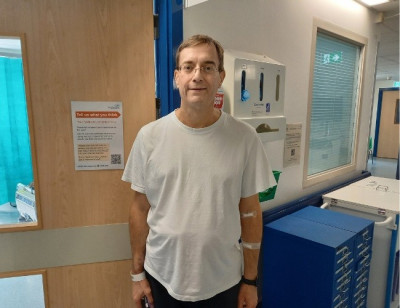
Created in 1994, the register allows people to state their intention to donate some or all of their organs or tissues after their death.
The register was set up as a result of a five-year campaign by John Cox and his daughter Christine after their son and brother, Peter, died of cancer in 1989.
Peter donated his organs to help others but his family were shocked to learn that no central register for organ donation existed.
The Cox family’s campaign changed all that. And thanks to this simple record, hundreds of transplant operations have successfully gone ahead at the Royal Free Hospital (RFH) – transforming or saving the lives of countless patients.
One patient who recently underwent a liver transplant at the RFH said his life had undoubtedly been saved, thanks to the organ register, and he and his wife are now vowing to add their names to it.
Stephen Spooner (pictured above), 52, required a transplant after his liver started failing and medication had no effect. During the past six months his condition worsened and finding a suitable donor liver became crucial.
He said: “If I hadn’t had the transplant I don’t think I’d have had much more than a few months left. I’m so grateful to the donor and donor’s family for making this decision. I’d also like to thank all the hospital staff who have been looking after me and will continue to do so.
“My wife Lex and I are both planning to sign up to become organ donors ourselves. It wasn’t something we’d paid much attention to before and to be honest I think we just thought we’d leave it to our children to make that decision, if and when the time came. But having been through this we both agree that we want to sign up so that our wishes are crystal clear.”
In 2019, the law around organ donation changed and everyone is now considered to agree to donate their organs when they die unless they record a decision not to.
However, no one is automatically added to the donor register and family members are still involved in the decision to donate. Therefore, it is vital that people sign up and tell their loved ones that they wish to donate.
Alice Workman, specialist nurse for organ donation, at the RFL, said: “Confirming your decision to donate on the NHS organ donor register makes it clear to your family that you want to be an organ donor, leaving them certain of your decision at what is a difficult and emotional time. We need more people to confirm their decision on the register today in order to save more lives now and in the future.”
More people than ever before are in need for a life-saving transplant across the UK, with over 7,600 people on the active waiting list, including 139 in Barnet, Camden and Enfield.
In Barnet, Camden and Enfield 177,376 people have already declared their decision through the NHS organ donor register, which is the best way for their family to know what they want. Nine out of 10 families will support organ donation if their loved one had confirmed their decision on the NHS organ donor register.
To find out more and confirm your decision, visit the NHS organ donor register at organdonation.nhs.uk. Users of the NHS app, can also use this to record, check or amend their details or decision.
Organ failure and transplant is one of the RFL’s group clinical priorities and over the coming years we will be focusing on prevention and early intervention, using data to identify groups in our local communities who are at risk.
 Translate
Translate